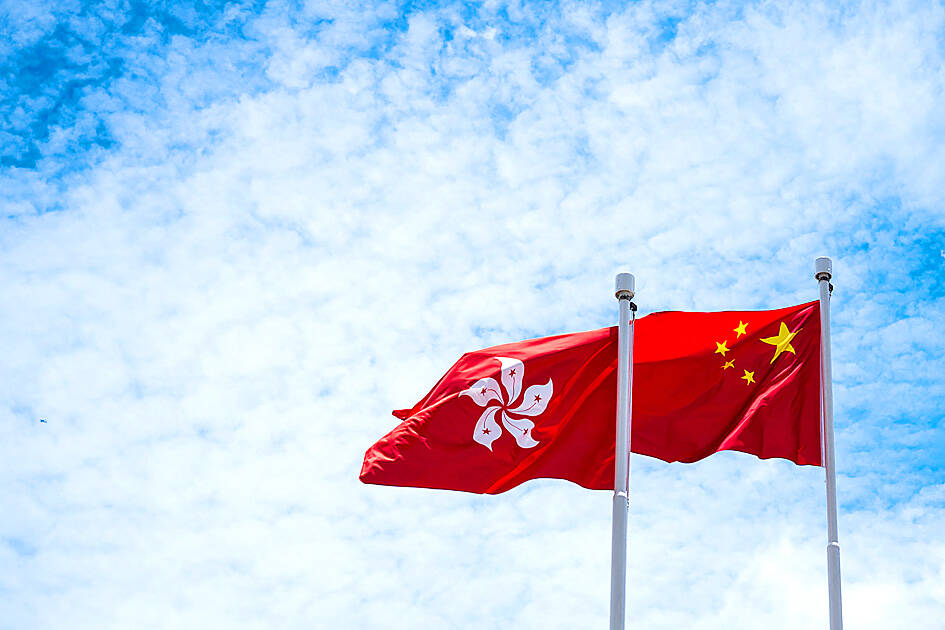A Hong Kong Christian newspaper has left its front page mostly blank ahead of the 35th anniversary of China’s 1989 crackdown on protesters in Tiananmen Square, as concerns mount about dwindling freedoms in the territory.
The weekly Christian Times wrote in its latest issue, an online version of which was published on Saturday, that it “can only respond to the current situation by turning paragraphs into blank squares and white space,” adding that society has become “restrictive.”
Hong Kong used to be the only place on Chinese soil where people could openly mourn those who died on June 4, 1989, when the government sent troops and tanks to crush democracy demonstrations in Beijing.

Photo: AFP
However, public forms of commemoration such as candlelight vigils have been banned or driven underground after Beijing-imposed the National Security Law on the territory in 2020.
Hong Kong this week arrested seven people for sedition, accusing them of making social media posts that “took advantage of an upcoming sensitive date.”
The Christian Times usually publishes content related to the massacre ahead of every anniversary, but this year said its front page could not be printed “due to an issue.”
“In recent years, Hong Kong’s society has changed drastically and become more restrictive,” the paper said in an editorial published along with another mostly redacted article. “Even a prayer based on historical memories may arouse ‘concern.’”
Hong Kong Bishop Stephen Chow (周守仁) this week called for forgiveness and healing in an article that obliquely referenced the June 4 anniversary.
“It is still a sore spot that needs to be properly addressed... Nevertheless, I realize that I cannot wait and must instead move forward,” Chow wrote.
A Catholic mass to commemorate victims of the Tiananmen crackdown — held annually for more than three decades — was axed in 2022 after organizers said they feared contravening Hong Kong law.
Hong Kong authorities have said the national security law was needed to stop violence and restore order after massive pro-democracy protests in 2019, while critics have accused the law of curtailing fundamental freedoms.

Eleven people, including a former minister, were arrested in Serbia on Friday over a train station disaster in which 16 people died. The concrete canopy of the newly renovated station in the northern city of Novi Sad collapsed on Nov. 1, 2024 in a disaster widely blamed on corruption and poor oversight. It sparked a wave of student-led protests and led to the resignation of then-Serbian prime minister Milos Vucevic and the fall of his government. The public prosecutor’s office in Novi Sad opened an investigation into the accident and deaths. In February, the public prosecutor’s office for organized crime opened another probe into

RISING RACISM: A Japanese group called on China to assure safety in the country, while the Chinese embassy in Tokyo urged action against a ‘surge in xenophobia’ A Japanese woman living in China was attacked and injured by a man in a subway station in Suzhou, China, Japanese media said, hours after two Chinese men were seriously injured in violence in Tokyo. The attacks on Thursday raised concern about xenophobic sentiment in China and Japan that have been blamed for assaults in both countries. It was the third attack involving Japanese living in China since last year. In the two previous cases in China, Chinese authorities have insisted they were isolated incidents. Japanese broadcaster NHK did not identify the woman injured in Suzhou by name, but, citing the Japanese

RESTRUCTURE: Myanmar’s military has ended emergency rule and announced plans for elections in December, but critics said the move aims to entrench junta control Myanmar’s military government announced on Thursday that it was ending the state of emergency declared after it seized power in 2021 and would restructure administrative bodies to prepare for the new election at the end of the year. However, the polls planned for an unspecified date in December face serious obstacles, including a civil war raging over most of the country and pledges by opponents of the military rule to derail the election because they believe it can be neither free nor fair. Under the restructuring, Myanmar’s junta chief Min Aung Hlaing is giving up two posts, but would stay at the

YELLOW SHIRTS: Many protesters were associated with pro-royalist groups that had previously supported the ouster of Paetongtarn’s father, Thaksin, in 2006 Protesters rallied on Saturday in the Thai capital to demand the resignation of court-suspended Thai Prime Minister Paetongtarn Shinawatra and in support of the armed forces following a violent border dispute with Cambodia that killed more than three dozen people and displaced more than 260,000. Gathered at Bangkok’s Victory Monument despite soaring temperatures, many sang patriotic songs and listened to speeches denouncing Paetongtarn and her father, former Thai prime minister Thaksin Shinawatra, and voiced their backing of the country’s army, which has always retained substantial power in the Southeast Asian country. Police said there were about 2,000 protesters by mid-afternoon, although